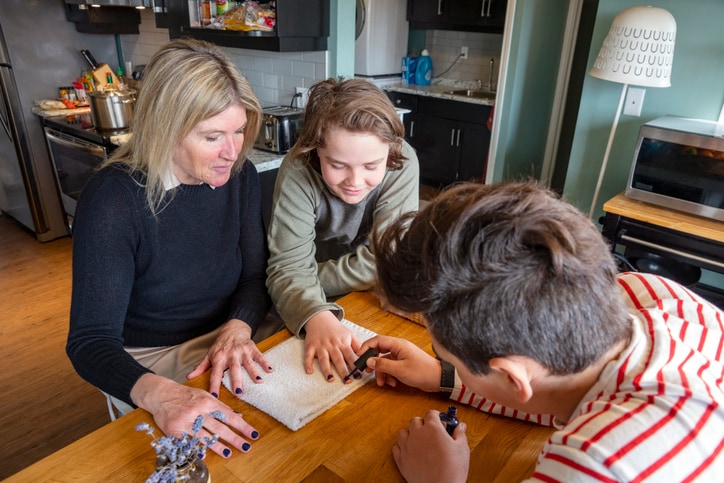by Erin Leyba, LCSW, PhD
A man wakes up happy. His son bounds down the stairs hollering and monkeying around. He wakes up his baby brother. He whines about something he cannot find. He didn’t want cereal, he wanted oatmeal. He won’t get dressed. Instead of growling back, the man observes his son, hugs him, and talks to him quietly, despite everything. Rather than getting swept into his son’s crabby mood, he continues to smile through his steaming coffee. Slowly, quietly, finally his son joins him with, “Can I set the table for breakfast?” Then later, “Can I sit on your lap?” The mood lifted. The son tiptoed into the pool of calm provided by his father, instead of the other way around.
It’s an admirable skill to stay rooted in your joy, no matter what moods bubble up, whine around, or leap off the couch behind you. Remaining grounded in peace and positivity when a little person is in a state of refusal, upset, or obstinance is not easy. It takes a crystal-clear intention to bolster your jolly state with so much strength that when the wind picks up and swirls you toward the chaos of the day, you’re not blown into the hot mess—you’re the firefighter. You’re the gentle oasis, the safe spot, the laughter, and the grace.
Staying peaceful despite a child’s challenging mood is one of the best ways to provide kids with “warmth,” which is related to higher self-esteem, better parent-child communication, and fewer psychological and behavior problems.
Parental warmth has also shown to protect children from risks associated with peer rejection, to mitigate the negative health risks stemming from childhood abuse, and to buffer against the negative health risks from low socioeconomic status or stress.
Here are a few ways to avoid “mood matching” when your little one is having a tough time:
Ground yourself.
Use mindfulness to observe what “comes up for you” when your child has a hard time. Notice any sensations in your gut, heart, or body. Take deep breaths, take a bathroom break, or step outside for a few minutes to focus back on peace. Know what calms you, whether it’s some Grateful Dead music, a chat with a friend, fresh air, or a cup of hot tea, (and be ready to use it).
Give your good mood roots.
Take care of yourself so your joy reaches beyond the amount of sleep you got, a sibling argument, or another potty accident. Be good to yourself. Know what makes you happy and be fiercely deliberate about pursuing it. Fill your spirit with the things you love, whether it’s bluegrass music, blueberry muffins, or Sunday football.
Remind yourself that development brings friction.
As children mature, there is a natural friction while they assert themselves. They get emotional as they realize they can’t do everything, be everything, or get everything. They are not always easygoing while they are super-busy touting their independence, separateness, and grown-upedness as if shouting it from a rooftop with a megaphone.
Visualize a rock.
Picture yourself a bright boulder so heavy an excavator couldn’t scoop it up. As you deal with the ups and downs that come with little ones (like a stuffed animal in the toilet or a spilled gallon of milk), you’re unchanging. You’re the rock that picks up the sun’s rays and reflects them toward everyone else.
Copyright Erin Leyba, LCSW, PhD
Erin Leyba, LCSW, PhD, author of Joy Fixes for Weary Parents (2017), is a counselor for individuals and couples in Chicago’s western suburbs www.erinleyba.com. Follow her on Facebook or Twitter or read her blog at www.thejoyfix.com






